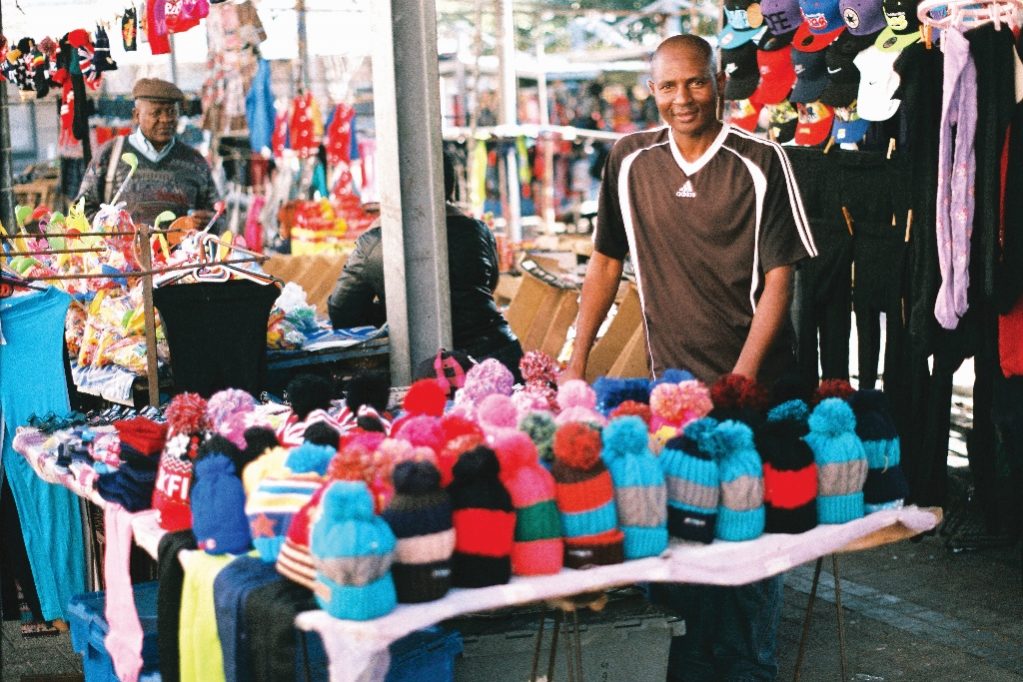You’ll find Cameroonian-born Fidelis Ebot Tabe in the heart of Cape Town, among colorful hats and caps, bargaining with customers. He’s tall and bursts into a smile whenever he speaks. At first glance he’s just another street trader among many, but this man has got a PhD in it.
“I didn’t invite my family to my graduation, after six years I couldn’t believe it, so I just told them when I got home,” he says.
His first degree in Cameroon was in history. He applied to professional schools to teach, but didn’t get in. Instead, he began trading food – dried prawns, dried fish and palm oil. After a friend told him about the prospects, he raised money and moved to South Africa.
“If I came down here, things would be better,” he says.
His South African story started 15 years ago in Mitchells Plain, a township in Cape Town located in the Cape Flats, selling caps, sunglasses and mobile accessories.
Loading...
“Mitchells Plain is like a warzone, you must watch out all the time, it’s so rough” he says.

While trading on the streets, he did his honors and master’s in history through the University of the Western Cape (UWC).
“I was in the town center in Mitchells Plain in 2007, there was a process to upgrade the center. At the end of the process, we had to choose trading bays. The issue came up of people who were there before, what we call historic traders, they gave them the opportunity to choose sides and what size they needed. For people who had been there for seven or eight years, they just gave us small bays. When it came to me doing street trading, I started looking at what policies were there before and how things were done before,” he says.
He registered for his PhD and started an analysis of street trading in Cape Town. His research began in the CBD, a hub of activity with street traders along every street. He interviewed traders who mirrored his experience.
“They had similar histories to myself, there were a lot of foreign traders in the city center. When the question came as to why foreign traders dominate, the response was that South Africans were not interested in street trading at the time. Now, when South Africans come, there isn’t any space for them and they start to complain. The foreigners took the opportunity but they prefer the CBD which is safer than the townships where there are always clashes between locals and foreign nationals,” he says.
South Africa has suffered from violent xenophobic attacks. In May 2008, thousands of foreigners were forced to flee their homes in townships across the country when people attacked them in a wave of xenophobic violence. April saw an upsurge in xenophobic attacks throughout the country as armed gangs once again attacked immigrants. At least five people have died; shops looted and destroyed.
“Home is home. In Cameroon you sleep in peace, you don’t have crime or xenophobia there. You go to our market and you have Malians there and Nigerians there. We don’t envy them. We live happily with them, they are our friends. When they go home, you long for them to come back. But here it’s a completely different story,” he says.
He dreams of being back in Cameroon one day.
“But to go home, you need money. I’ve been here for 15 years and what do I have to show them back home?” he says.
Ebot Tabe wanted to challenge the stereotypes of the street trader.
“There’s this idea that street traders are poor. From my interviews with traders, they were not poor people. People actually left their jobs to become street traders because they believed that they would make more from street trading than from formal employment. And it’s true,” he says.
When it comes to street trading, a lot of people sell the same thing but Ebot Tabe explained that traders are a community that support each other.
“In Trafalgar Place in town, the flower sellers aren’t ideally located. There are just three stands in front of Adderley Street and the rest are at the back. They sell the same thing but you only see the people who stand in front. They began a rotation, so every day they would move one place down so that each person has the opportunity to sell in the front,” he says.
After six years of research, rewrites and clashes with his supervisor, he graduated in March this year.
“I’ve never found street trading frustrating until now. Why should I be sitting here? I hope to become a lecturer one day and not remain a street trader. I want to teach public and urban history so I can bring in my experiences,” he says.
For now, the doctor of street trading is selling in Mitchells Plain.
Loading...
